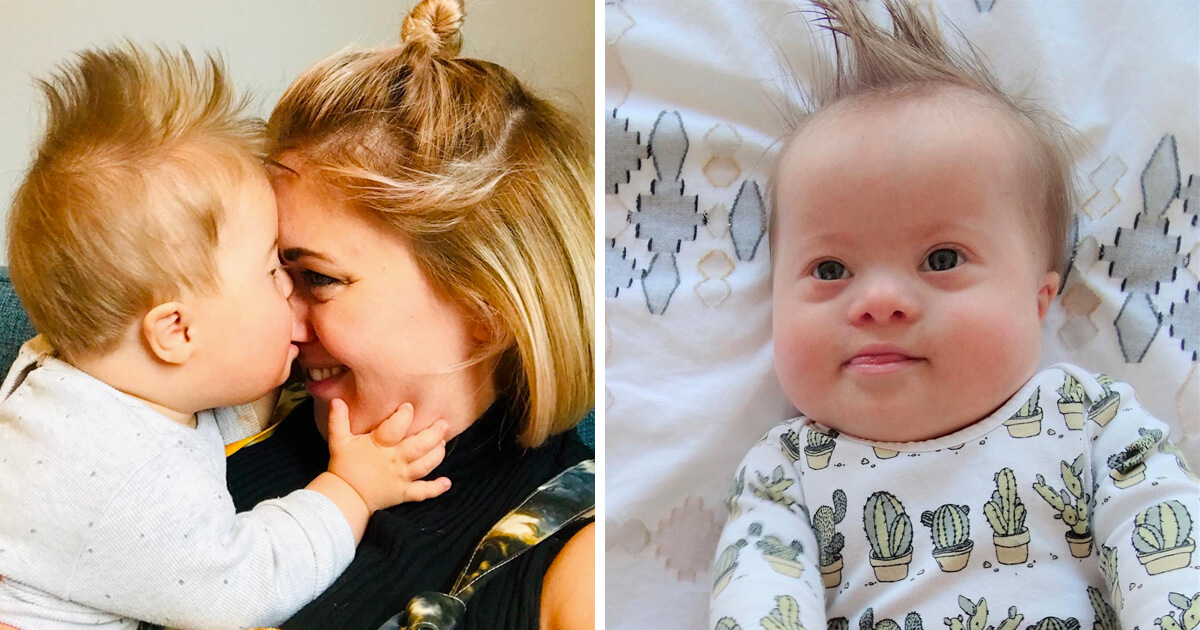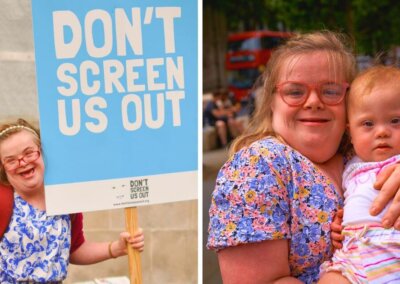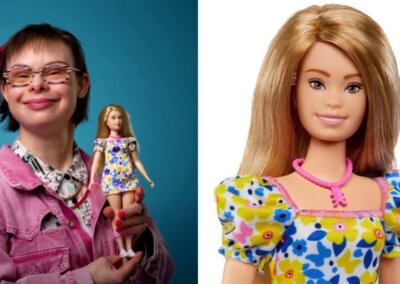The mother of a baby with Down’s syndrome is challenging the UK Government’s discriminatory abortion law which singles out babies with disabilities allowing abortion right through to birth – even for including cleft lip, cleft palate, club foot and Down’s syndrome.
Máire Lea-Wilson, whose eleven month-old son Aidan has Down’s syndrome, says she was encouraged in hospital to abort her son when a scan at 34-weeks revealed he had the condition.
The mother has joined forces with Heidi Crowter, a 24-year-old woman from Coventry who has Down’s syndrome, to bring forward the landmark case against the UK Government.
Recalling her experience, Máire said: “I felt like the assumption was that we would abort our baby.”
Earlier this week, she told Sky News: “I have two sons and I love and value them equally and I think it seems really wrong that the law doesn’t value them equally.”
Heidi Crowter added: “It’s downright discrimination”.
Their case is being presented by solicitor Paul Conrathe of Sinclairslaw, who will lodge papers at the High Court this week.
Currently, abortion is available up to birth in England, Wales and Scotland if the baby has a disability, including Down’s syndrome, cleft lip and club foot whereas if the baby does not have a condition, there is a 24-week time limit.
In 2018, there were 3,269 disability-selective abortions. 618 of these were for Down’s syndrome, representing a 42% increase in abortion for Down’s syndrome in the last ten years with figures rising from 436 in 2008 – and the figures could be much higher.
In a 2013 review on disability-selective abortions, it was revealed 886 babies were aborted for Down’s syndrome in England and Wales in 2010 but only 482 of these were reported in official Department of Health records. The underreporting was confirmed in 2014, in a Department of Health review.
The UN Committee on the Rights of Persons with Disabilities has consistently criticised countries which provide for abortion on the basis of disability.
The Committee on the Rights of Persons with Disabilities Concluding observations on the initial report of the United Kingdom of Great Britain and Northern Ireland made a key recommendation that the UK change its abortion law on disability so that it does not single out babies with disabilities. The Government continues to ignore this recommendation.
The Disability Rights Commission (now the Equality and Human Rights Commission) have said that this aspect of the Abortion Act “is offensive to many people; it reinforces negative stereotypes of disability…[and] is incompatible with valuing disability and non-disability equally”.
The 2013 Parliamentary Inquiry into Abortion for Disability found the vast majority of those who gave evidence believed allowing abortion up to birth on the grounds of disability is discriminatory, contrary to the spirit of the Equality Act 2010 and that it affects wider public attitudes towards discrimination. The Inquiry recommended Parliament reviews the question of allowing abortion on the grounds of disability and should consider repealing section 1(1)(d) of the Abortion Act which allows for it.
Disabled peer Lord Shinkwin had a Bill in the House of Lords that would have repealed section 1(1)(d) of the Abortion Act – the Bill was undefeated but unfortunately ran out of time. Lord Shinkwin’s Bill was supported by Disability Rights UK.
Boris Johnson’s Government has recently introduced new abortion regulations to Northern Ireland. The regulation that the Northern Ireland Office introduced allow abortion up to birth for disabilities including Down’s syndrome, cleft lip and club foot.
Over 1,800 people with Down’s syndrome and their families signed a letter to Boris Johnson urging him to ensure that selective abortion for Down’s syndrome was not introduced to Northern Ireland.
Polling has shown that the majority of people in England, Wales and Scotland feel that disability should not be a grounds for abortion at all, with only one in three people thinking it is acceptable to ban abortion for gender or race but allow it for disability.
Heidi Crowter, from Coventry, who has Down’s syndrome said:
“At the moment in the UK, babies can be aborted right up to birth if they are considered to be “seriously handicapped”. They include me in that definition of being seriously handicapped – just because I have an extra chromosome! Can you believe that?
“What it says to me is that my life just isn’t as valuable as others, and I don’t think that’s right. I think it’s downright discrimination!
“The United Nations Committee on the Rights of Persons with Disabilities recently said that the United Kingdom should change its abortion law to make sure that people like me aren’t singled out because of our disabilities.
“Sadly, the Government decided to ignore their recommendations and didn’t change the law. So now, I am going to take the Government to court with other members of the Down’s syndrome community to make sure that people aren’t treated differently because of their disabilities.”
Máire said: “I have two sons and I love and value them equally and I think it just seems wrong that the law doesn’t value them equally and we want to change that.
“I love and value them equally, so I don’t see why they are not valued equally by the law.
Once it was thought the baby had Down’s syndrome, the first thing they wanted to talk about was whether we wanted to terminate the pregnancy, and I was 34 weeks pregnant, so it was quite a difficult question to get asked at a time when I was scared and vulnerable.
“It is really tough to think back on that, I find it really difficult to think that Aidan’s life isn’t seen as valuable as his older brother’s, it makes me worry as to whether he’ll be seen the same or treated the same.
“I felt like the assumption was that we would abort our baby.
“Our case is not about the rights and wrongs of abortion. It’s about the specific instance of inequality in the law, whereby for a child without disability the legal limit is 24 weeks, but you can have an abortion right up to full term with a child that does have a disability. That just feels wrong.
“I also really worry that when he’s older if this law is still in place, how will that make him feel: that he’s not as valuable, that he doesn’t have equal worth?
“Aidan is a little ray of sunshine. I would not change him for the world.
“He’s had some challenges and done so well so we’re just really proud of him.”
Sally Phillips, actress, comedian and mother to Ollie who has Down’s syndrome told the Times: “Given advances in medical care and quality of life for people with Down’s syndrome, the different right to life is beginning to look not just dated but barbaric.”
A spokesperson for Don’t Screen Us Out, Lynn Murray said:
“By stating that disability is grounds for termination, section 1(1)(d) of the Abortion Act, promotes inequality. It would be totally condemned if a country’s abortion laws singled out babies on the ground of gender or skin colour, but because it’s a disability such as Down’s syndrome, that’s somehow ok? This is inequality, sanctioned, sponsored and funded by the state.
“This provision in the Abortion Act is a hangover from a time when we had totally different attitudes to the inclusion and contribution of people with disabilities. You only have to look at the discriminatory language used by all sides of the debate in Parliament when this was discussed in 1967 and 1990 to realise how far attitudes have changed. Society has moved on but the law hasn’t. It’s time it did.”
“We live in a society which proclaims that we want to empower those with disabilities, and that regardless of your background, you deserve a fair and equal chance at life. We believe that our laws must reflect this narrative.”












